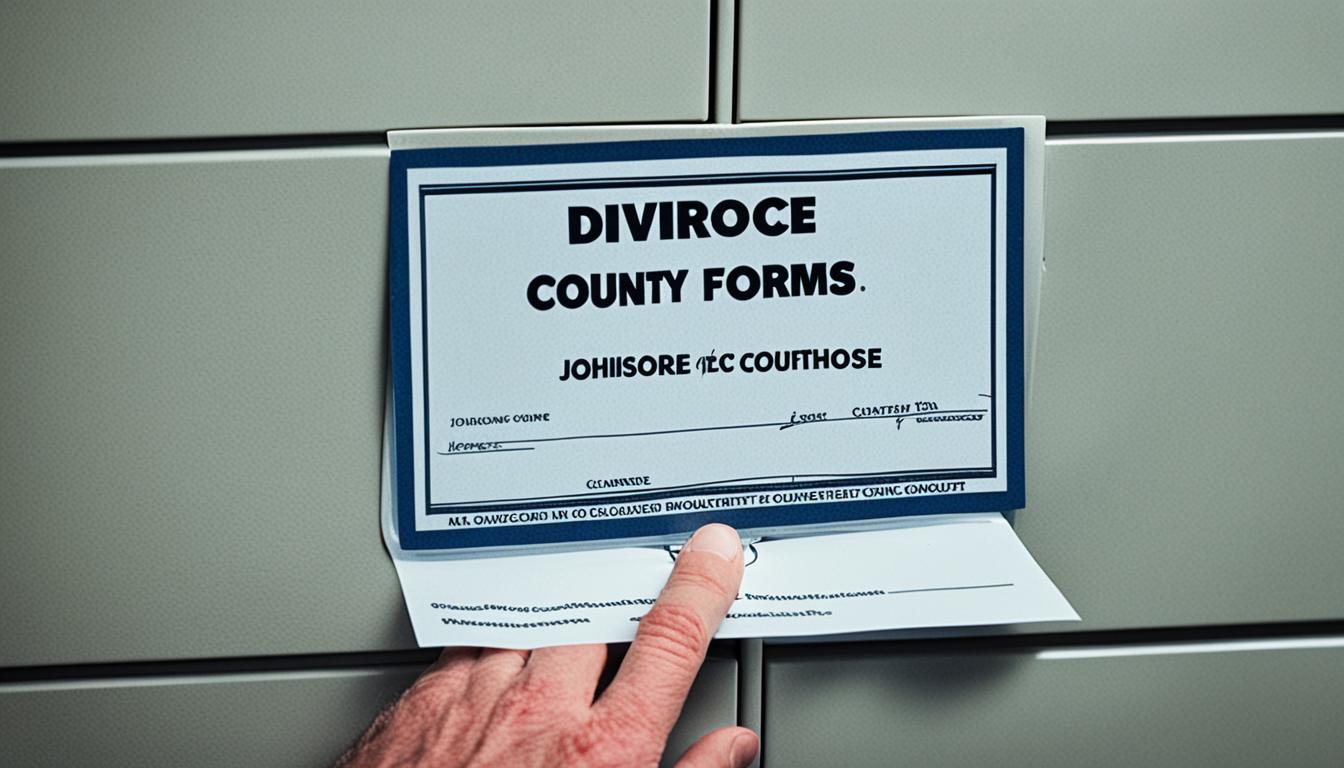Physical Address
304 North Cardinal St.
Dorchester Center, MA 02124
Physical Address
304 North Cardinal St.
Dorchester Center, MA 02124

What’s the one thing more daunting than deciding to end a marriage? Navigating the maze of paperwork and legal procedures to make it official. If you’re in Johnson County, KS, and facing this situation, you’re not alone.
Filing for divorce can feel overwhelming, but it doesn’t have to be a journey into the unknown. In this article, we’ll break down the steps, simplify the legal jargon, and guide you through the process.

Whether you’re amicably parting ways or facing complex disputes, understanding the local laws will make a world of difference. Ready to turn the page and start a new chapter? Keep reading to find out how to file for divorce in Johnson County, KS, with less stress and more clarity.
To get more info on filing for divorce in Kansas, find a detailed overview in our article, How to File for Divorce in Kansas.
Before filing for divorce in Johnson County, Kansas, it is important for you to understand the residency requirements. In order to file for divorce, at least one spouse must have been a resident of Johnson County for a specified period of time. Typically, the residency requirement is 60 days.
If you or your spouse do not meet the residency requirements, it is advisable to seek legal advice to determine your options. Understanding the eligibility criteria is crucial to ensure that your divorce case can proceed smoothly in Johnson County.
Meeting the residency requirements is an essential step for filing for divorce in Johnson County, Kansas. By being aware of these requirements, you can be better prepared to navigate the divorce process and ensure that your case is handled in the appropriate court.
| Residency Requirement: | Johnson County, KS |
|---|---|
| Minimum Residency Period: | 60 days |
In Johnson County, Kansas, you have the option to file for divorce based on both no-fault and fault-based grounds. Understanding these grounds is important as they can have an impact on the divorce process and the outcomes of your case.
No-fault grounds for divorce in Johnson County typically revolve around irreconcilable differences or incompatibility between the spouses. This means that you and your spouse may have reached a point in your marriage where you no longer get along and believe that continuing the relationship is not possible or beneficial to either party. No-fault divorces usually involve mutual consent and do not require proving any wrongdoing by either spouse.
By filing for a no-fault divorce, you acknowledge that your marriage cannot be sustained and believe that ending the marriage is in the best interest of both parties involved. No-fault divorces tend to be less contentious and can generally lead to a smoother and more amicable process.
Alternatively, you can file for divorce in Johnson County based on fault-based grounds. These grounds may include actions or behaviors by one spouse that have led to the breakdown of the marriage. Common fault-based grounds for divorce can include adultery, cruelty, or abandonment.
Fault-based divorces require providing evidence or testimony to support the claim of wrongdoing by one spouse. This can involve gathering documentation, such as phone records or witness statements, to provide proof of the alleged misconduct. It’s important to consult with an attorney to understand the specific requirements and procedures for filing a fault-based divorce in Johnson County.
When deciding whether to file for divorce based on no-fault or fault-based grounds, it’s essential to consider the specific circumstances of your situation, the potential implications on child custody, property division, and other relevant factors. Consulting with an experienced divorce attorney can help you determine the most appropriate grounds for your divorce and guide you through the process.
Filing for divorce in Johnson County, Kansas involves several important steps. It’s essential to understand the process and ensure that you complete all necessary forms and documentation. Whether you’re representing yourself or seeking legal assistance, this section will guide you through the entire divorce filing process in Johnson County.
Before you can start the divorce process in Johnson County, you’ll need to gather the necessary documents. These may include:
Having these documents ready will help streamline the filing process.
Once you have the required documents, it’s time to complete the divorce forms. Make sure to carefully fill out each form, providing accurate and detailed information. Pay close attention to any specific instructions or guidelines provided by the Johnson County court system.
After completing the divorce forms, you’ll need to file them with the Johnson County court. Visit the appropriate court location and submit the forms, along with any filing fees that may be required. The court will provide you with a case number and further instructions for the next steps in the process.
Once the divorce forms are filed, you must serve the divorce papers to your spouse. This typically involves delivering the documents in person or through certified mail. It’s important to follow the specific rules and guidelines for serving documents in Johnson County to ensure that the service is legally valid.
Completing these steps will set the divorce process in motion. It’s crucial to consult with an attorney or utilize other legal resources to ensure that you are following the correct procedures and protecting your rights throughout the divorce process in Johnson County, Kansas. By understanding the necessary steps and gathering the required documentation, you can navigate the divorce filing process more confidently.
Filing for divorce in Johnson County, Kansas requires the payment of certain fees. It’s essential to be aware of the filing fees and any additional costs associated with filing for divorce in Johnson County. By understanding the fees involved, you can better prepare for the financial aspect of the divorce process.
| Service Description | Fee |
|---|---|
| Filing Fee | $196.50 |
| Review Fee for Trust Clerk | $30.00 |
When filing for divorce in Johnson County, you will need to consider the following fees:
It’s important to note that the fees mentioned above are subject to change, and it’s advisable to verify the current fees with the Johnson County District Court. By understanding the filing fees and additional costs involved, you can make informed financial decisions throughout the divorce process.
If you are unable to afford the filing fees for divorce in Johnson County, Kansas, you may be eligible for a fee waiver.
A fee waiver allows individuals with limited financial resources to proceed with their divorce without paying the usual fees associated with the process.
To qualify for a fee waiver in Johnson County, you will need to meet certain eligibility criteria. The specific requirements may vary, but generally, you will need to demonstrate that you are experiencing financial hardship and unable to afford the fees.
To obtain a fee waiver for divorce in Johnson County, follow these steps:
It’s important to note that fee waivers are typically granted on a case-by-case basis, and the court has the discretion to approve or deny an application. Providing accurate and comprehensive information, along with supporting documentation, can increase your chances of obtaining a fee waiver for your divorce in Johnson County, Kansas.
By obtaining a fee waiver, you can navigate the divorce process without the financial burden of filing fees, ensuring that access to justice is available to all individuals, regardless of their financial circumstances.
The court is located at:
150 W Santa Fe St, Olathe, KS 66061, United States
The Johnson County divorce court process involves several steps to ensure a fair and orderly resolution to your divorce. Here is an overview of the main stages:
Keep in mind that the divorce court process may vary in Johnson County based on the unique circumstances of each case and the specific court where the case is filed. It is advisable to consult with an attorney or seek legal advice to ensure you understand and navigate the court procedures correctly.
If you’re considering filing for divorce in Johnson County, Kansas without an attorney, it’s important to understand the process and the steps involved. While hiring a lawyer can provide valuable support, you have the option to file for divorce on your own. Here are the key steps to guide you through the DIY divorce process in Johnson County.
1. Gather the necessary forms: Start by obtaining the required divorce forms. These forms can typically be found on the Johnson County District Court’s website or by visiting the courthouse in person. Make sure to gather all the relevant forms and carefully read the instructions before proceeding.
2. Complete the forms accurately: Take your time to fill out the forms accurately and provide all the required information. Be sure to double-check the forms for any errors or missing information. If you are unsure about how to complete a particular section, consult the instructions or seek assistance from the court clerk.
3. File the forms with the court: Once you have completed the forms, it’s time to file them with the court. Make multiple copies of all the forms before submitting them. Take the originals and copies to the courthouse and file them with the clerk’s office. You will be required to pay the filing fee at this time.
4. Serve the divorce papers: After filing the forms, you must serve the divorce papers to your spouse. This can be done through certified mail or by hiring a professional process server. It’s crucial to follow the proper procedure for serving the papers to ensure they are legally valid.
Filing for divorce without an attorney in Johnson County, Kansas can be a complex process, but it is possible with careful preparation and attention to detail. Remember to consult the court’s website or seek guidance from the court clerk if you have any questions or need assistance. By following these steps, you can navigate the DIY divorce process in Johnson County.
To see how this process of filing for divorce in Johnson County compares to that in other Kansas counties, check out our articles about how to file for divorce in Shawnee County and filing for divorce in Sedgwick County.